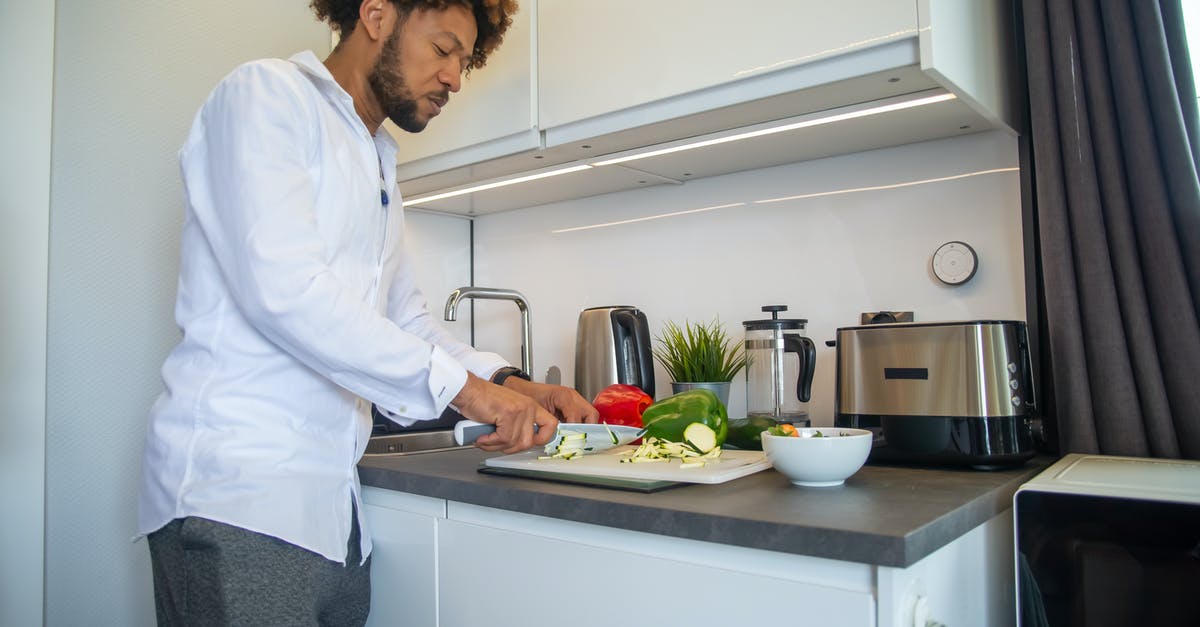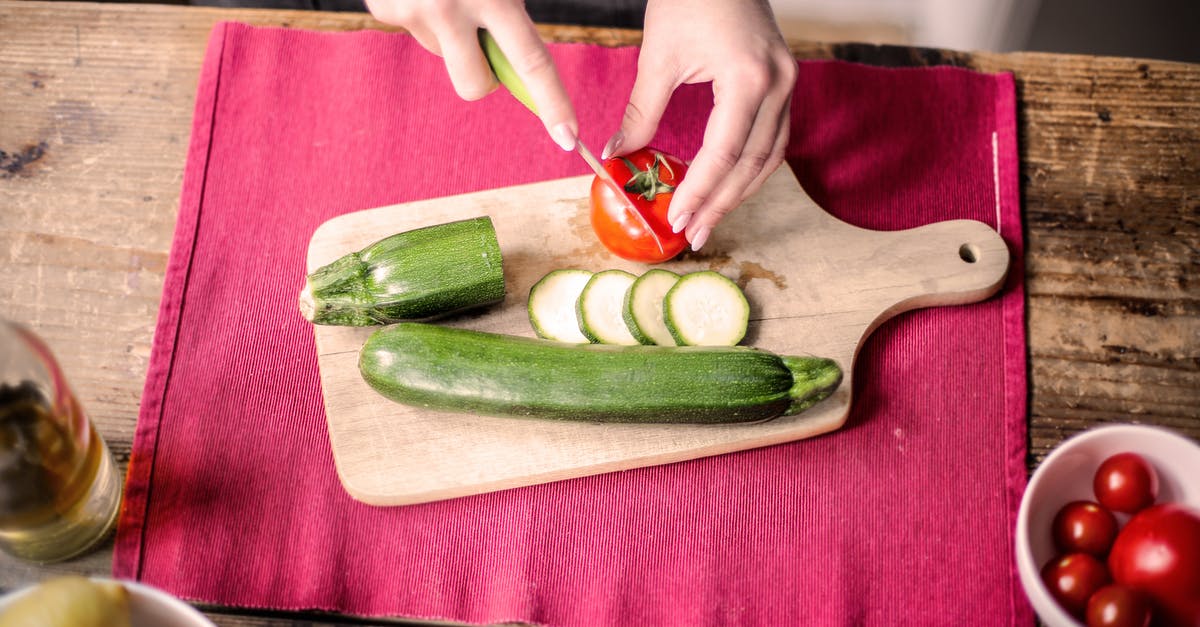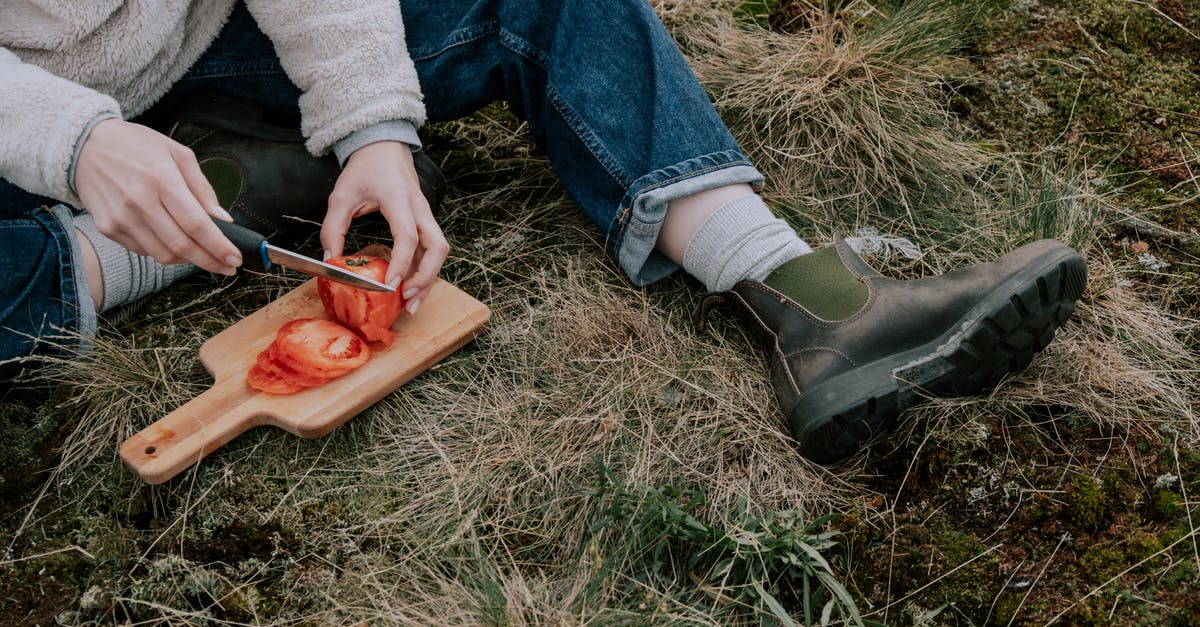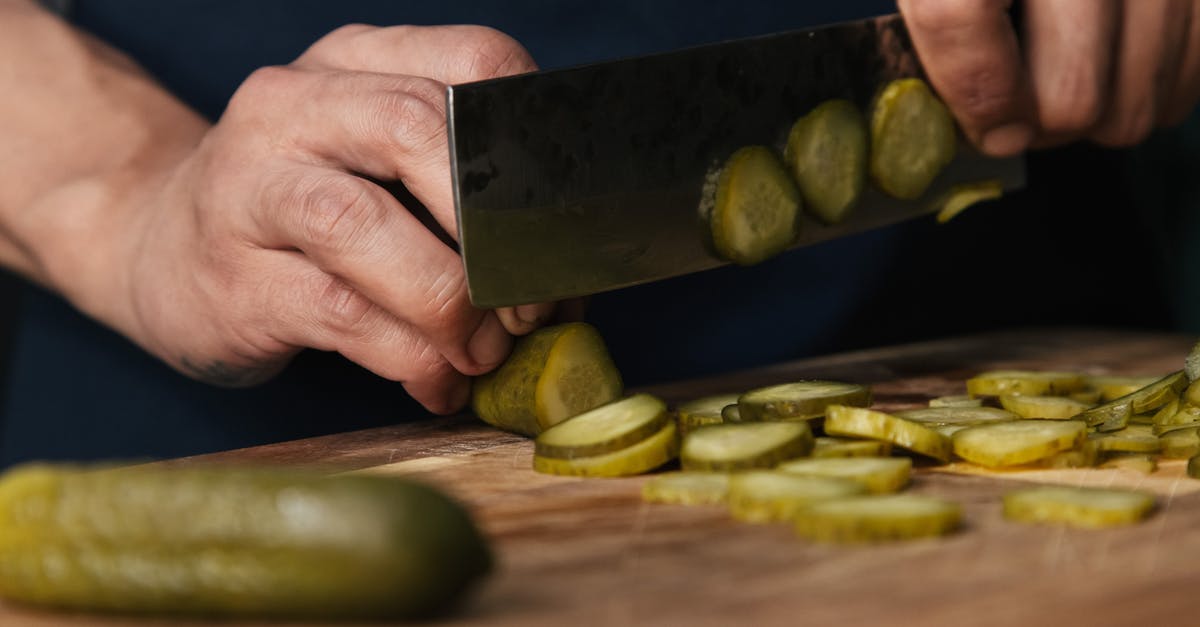Is it bad to be a 'board tapper', i.e. to tap your knife rhythmically when you're cutting vegetables?

I briefly worked in a restaurant kitchen in Hong Kong under a British chef. He objected to the sound I made when slicing onions, and warned me not to be a 'board tapper'. I duly spent the next weeks learning to slice onions his way, though I wasn't able to match the speed I'd been accustomed to using the method I'm more practised in.
I've lived in Asia for many years, and use a Chinese vegetable knife/ Chinese chef's knife (CCK - NOT a cleaver) to cut almost everything. These tall, relatively straight-edged knives are used by Chinese chefs for the majority of tasks, and are employed using either a 'push cut' to force the blade through denser materials, a 'chop cut' in which the whole edge hits the board more or less parallel to it, or a 'draw cut' in which the tip of the blade is drawn back through softer materials, the angle at which the knife is held and the depth of the material being cut together determining how much of the edge's length does the cutting.
European chefs typically use French-/ German-style chef's knives with long, pointed, curved blades and favour a 'rocker' cut (during which the tip of the blade stays in contact with the board) for slicing medium-density ingredients like onions, as taught by Jamie Oliver et al.
The rocker cut is quiet and sustains high frequencies, although like the push cut it does require some vertical force from the cook's arm. The chop cut also sustains high frequencies and requires little force, relying instead upon a heavier blade to let gravity do the work, but it is noisy. (The draw cut is almost silent and can be very precise, but is slower partly because it requires the movement of the whole arm.) Each has its different applications.
Through some cursory research, I found out that tapping one's knife on the board even when not cutting anything can serve a number of functions:
- Activate muscle memory prior to cutting to avoid poor first cuts
- Remove pieces of food from the blade after cutting
- Warn others that a knife is about to be wielded
- Attract attention (valuable to street-kitchen chefs)
- Punctuate speech (valuable to television chefs)
- Add flair to one's work/ annoy people around one.
Whilst this kind of non-cut tapping is a separate matter, its various reasons cast light upon the types of issues surrounding human sounds in the kitchen, amid the roaring and grinding and hissing, churning, and beeping of various machines. Noise itself, clearly, isn't the problem.
I've come across the 'board-tapper' criticism elsewhere, in books, and often wondered whether this is mostly a tech thing (curved blades rock, straight blades tap), a culinary chauvinism thing (Asians tap, and cheap CCKs are not welcome in non-Asian kitchens), or a kitchen-hierarchy thing (chefs de commis should be seen and not heard).
As the extra noise probably equates to extra wear on the blade it could be a 'maintenance thing', and reasonably so were it not that most cooks don't sharpen other cooks' knives. Although the vast majority of jobbing chefs in the West use standard, serviceable implements made by the likes of Victorinox, not artworks of folded steel by artisan knifemakers, a heightened awareness of luxury goods everywhere has inevitably led to a heightened interest how they should be cared for - but as the explosion of interest in craft knifemaking has been very much an Internet-enabled phenomenon, its roots don't go back far enough to explain the prejudice. Outside of Japan, at least, using posh knives for mundane work is a relatively new thing.
Onions are onions everywhere... So why does board-tapping matter so much to some people?
Best Answer
I know, this isn't really an answer, but it's a bit long for a comment:
There are people in this world that get annoyed by different things that don't bother other people. For some of those people, it's noise ... someone tapping their foot, chewing gum, etc. It's possible that there's a legitimate reason for this pet peeve, but sometimes it's something really odd like 'I had a friend who used to do that, and my partner left me for them, and so when I hear it reminds me of that' ... but it's subconscious, and they couldn't explain it without a year or two of therapy. I've also known people who were sensitive to sound (and he complained that I spoke too loudly ... but he always spoke loudly, and I'd subconsciously match my levels to his ... and he hated wearing hearing protection).
For reasons that most other people would understand:
- The person may be using sound cues in their cooking (how something sizzles as it hits the pan, or how the sound changes as something is frying), and if there is too much noise, they can't hear those cues.
- The person may have difficulty concentrating (possibly even ADD), and they find the noise distracting
- In a noisy kitchen, people have to talk louder, which means that other people have to talk even louder ... and after a while, the noise is just unbearable, and in the US, can actually become an OSHA violation.
- A noisy kitchen may cause people to not hear or mishear instructions, resulting in slower or bad service.
Of course, if the chef is also shouting at people all the time, then it's difficult to accept the above items as good justification. (except maybe #4).
There have been a number of articles on noise levels in restaurants in the past few years and most focus on the patrons (and there are even apps for patrons to track noise levels, but many of the observations about lack of sound dampening still hold true:
- https://www.vox.com/2018/4/18/17168504/restaurants-noise-levels-loud-decibels
- https://www.theguardian.com/food/2019/may/09/great-food-but-please-do-something-about-the-noise-the-battle-for-quieter-restaurants
Sometimes, we have to factor in multiple considerations when deciding how to do something. In project management, there's the adage of "good, cheap, fast. pick two", in how you have to sacrifice quality, cost, or speed and can't have all three. Some chefs will cut off the top & bottom of bell peppers so that they can make equally sized sticks. I cut off the sides and bottom so I waste less. Neither way is "bad", but we just have different priorities.
In your particular case, the chef has decided that the noise level (or at least, lack of tapping noise) is more important to them. Someone else might optimize for speed and be okay with a certain level of noise. Someone else might have space for you to do your prep further away so you're not bothering them. There are just different trade-offs to try to get to the optimal solution for a particular situation. And it may not even be constant with a given chef -- someone who would otherwise prioritize speed might have a hangover and have a day when they'd prefer quiet.
Pictures about "Is it bad to be a 'board tapper', i.e. to tap your knife rhythmically when you're cutting vegetables?"



How do you cut vegetables without sticking to knife?
Strategy #2: Sharpen your cutting technique Not only does this reduce your effort (the blade enters into the food sideways rather than pressing down on it) and produce neater results, it also allows you to increase your cutting speed, which in turn reduces sticking.How do I get faster at chopping?
Keep your fingertips bent inwards to make sure only your knuckles can come into contact with the blade of the knife. After all, with it you determine the tempo and it also become impossible to cut yourself (as long as you keep the knife straight).Should you bend your fingers when cutting with a knife?
Pinch the base of the blade with your thumb and index finger.Is it bad to be single?
More answers regarding is it bad to be a 'board tapper', i.e. to tap your knife rhythmically when you're cutting vegetables?
Answer 2
Don't let your ego run away with the onions!
This reminds me of a common situation I encountered when I lead a major software engineering project. (I'm not a chef.)
In software engineering, it's important that very large projects have a consistent style to their programming. (Much like how a restaurant needs to serve consistent food, and its kitchen needs to run in a consistent manner.) Often, different programming style choices aren't better or worse. What's important is that, overall, the style is consistent so that everyone can read everyone else's work in the program.
I often had newcomers to my team try to argue with me about style:
- One newcomer wanted to follow a particular style that wasn't better or worse than our existing style. They didn't appreciate that a consistent style within the team was more important than the specific style each developer followed.
- Another newcomer pointed me to articles written by their college professor about coding style. I pointed out major logical flaws in the professor's arguments.
- And finally one newcomer proposed a minor change that looked weird. Even though their argument was valid, I requested that we keep with consistent style that the rest of the team already used.
What was happening was that the newcomers to my team were letting their egos get ahead of teamwork. I even tried to guide the team towards ways of improving our style, but the developers who wanted to follow their preferred style never put in the time needed to overall improve the style that we, as a team, followed.
In your case, it's hard to know the context:
- Was your boss (the British chef) a micromanager or a control freak? In that case, the problem wasn't your chopping style. It's a good thing you're no longer working under that chef.
- Is your personal chopping style important to the overall functioning of the kitchen (or restaurant)? If so, I don't think this was properly communicated to you. I hope they treated you well on your final days on the job.
- Was there a missed opportunity for compromise or "managing up?" Perhaps the only point you needed to make was something like, "This is how I learned how to use a knife. It's how I stay safe, cut consistently, and quickly." In software, the term "managing up" refers to when a subordinate is able to guide their boss.
One of the things I never did was manage how people on my team arranged their desks, how they organized their computers, and even the specific programs they used in their day-to-day workflows.
In contrast, I once worked for a lead developer who did micromanage how I did my work. The problems that arose were because the lead was a control freak and didn't know how to let go. They had less to do with the minutiae of any specific programming topic. In one case, we discussed some problematic areas in our workflow. The lead developer quickly became illogical. I should have found another job shortly after the conversation.
Thus: I urge you to reflect a bit more on the team dynamics of your experience. Was your old boss (chef) a micromanager or a control freak? Did you let your ego run away? Or, do you need to be more careful in choosing where you work, making sure that your chopping style is appreciated?
Sources: Stack Exchange - This article follows the attribution requirements of Stack Exchange and is licensed under CC BY-SA 3.0.
Images: Kampus Production, Andrea Piacquadio, cottonbro, Ron Lach
